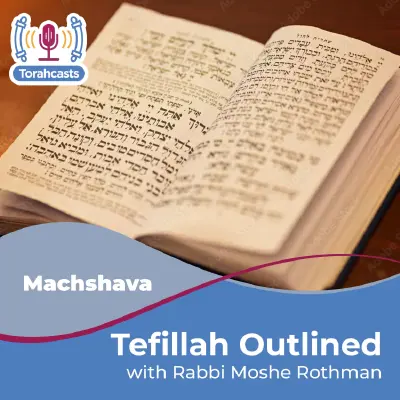
Tefillah Outlined
94 episodes Last Updated: Apr 27, 25
Embark on a journey through the intricate tapestry of our daily Tefillah as we comprehensively unravel its layers, delving into the profound structure, themes, and meanings behind the words woven into our Davening. Using the classical commentaries on Tehillim and Tefillah, we are endeavoring to bridge the gap between the form and essence of prayer. Together, let's uncover the timeless wisdom encapsulated in each heartfelt utterance.
Episodes
Apr 27, 2025
Tefillah Outlined #94: המעריב ערבים
Explanation of the first ברכה of ברכות קריאת שמע של מעריב, המעריב ערבים, where we praise Hashem for creation primarily nighttime and controlling night and day as well as the metaphorical night and day with the ushering in of the גאולה העתידה and ultimate judgement of evil.
Apr 20, 2025
Tefillah Outlined #93: Introduction to מעריב
Introduction to מעריב, discussing the origins of מעריב, timeframe, obligation and structure.
Apr 13, 2025
Tefillah Outlined #92: שלום רב
Explanation of שלום רב and the significance of the changing text of ברכת השלום during מנחה.
Apr 06, 2025
Tefillah Outlined #91: Introduction to מנחה
Introduction to מנחה, discussing the origins, timing, organization and impact of מנחה.
Reflection and review of the overall תפילת שחרית, its structure and themes.
Reflection and review of the סיום התפילה, explanation of קדיש, overview of שיר של הלויים and various themes found in this section of שחרית.
Mar 16, 2025
Tefillah Outlined #88: לדוד ה׳ אורי וישעי
Explanation of לדוד ה׳ אורי וישעי, where we discuss דוד's ultimate request in life (despite all his struggles) --- to connect with הקב״ה, and this theme is internalized throughout the ימי התשובה.
Explanation of שיר של הלויים ליום שישי, where we discuss the end of days as all of mankind recognizes Hashem and His kingdom.
Explanation of the שיר של הלויים ליום חמישי, where the מזמר calls for the recommitment of the Jewish nation to serve Hashem, recognizing Hashem's care for His people during יציאת מצרים, modeled by יוסף's freedom from prison as well as the need to serve Hashem with a mission and joy amidst the exile.
Explanation of the שיר של יום רביעי, where we describe the suffering of the Jewish people in the גלות, the success of the evildoers and their theological claims, and the response to suffering and declaration that Hashem will destroy evil in the end. Ultimately through this process the Jewish nation along with the rest of the world will praise Hashem in this new era of redemption.